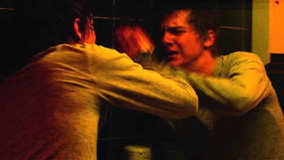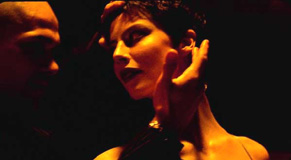|
Newest Reviews:
New Movies -
The Tunnel
V/H/S
The Tall Man
Mama Africa
Detention
Brake
Ted
Tomboy
Brownian Movement
Last Ride
[Rec]≥: Genesis
Hara-Kiri: Death of a Samurai
Indie Game: The Movie
Abraham Lincoln: Vampire Hunter
Old Movies -
Touki Bouki: The Journey of the Hyena
Drums Along the Mohawk
The Chase
The Heiress
Show
People
The Strange Affair of Uncle Harry
Pitfall
Driftwood
Miracle Mile
The Great Flamarion
Dark Habits
Archives -
Recap: 2000,
2001, 2002,
2003, 2004
, 2005, 2006,
2007 , 2008
, 2009 ,
2010 , 2011 ,
2012
All reviews alphabetically
All reviews by star rating
All reviews by release year
Masterpieces
Screening Log
Links
FAQ
E-mail me
HOME
| |
La Vie Nouvelle (Philippe Grandrieux, 2002)
 The human body is the most often photographed subject in
cinema, so when a director manages to find ways to make it look newly erotic,
alien, and exciting, itís tough not to stand up and take notice of the
achievement. Set primarily in a derelict Eastern European hotel, La Vie Nouvelle (A New Life), the second feature from French
director Philippe Grandrieux aims to approximate a state of mind in which an
individualís senses become overwhelmed to the point where they begin blanking
out. In pushing his characters to such extremes though sexual, emotional, and
chemical means, the director creates a style in which his experimental visual
and aural flourishes have as much narrative justification as anything else in
the film. By switching film stocks, allowing the cameraís focus to lapse, and
putting his camera so close to his actors that it becomes wholly complicit with
the cast in delivering the emotion in their performances, Grandrieux creates a
tactile, inescapably immediate atmosphere. The grim existence eked out by his
cast in a busted economy seemingly sustained by prostitution, gangsterism, and
the tourism of those looking for a place where money can buy them some wholesale
depravity is one where conventionality has no place. Even something as essential
to routine life as verbal communication seems out of place when it crops up in
this context, and the expressive body language of the actors rises up to fill
the gap.
The human body is the most often photographed subject in
cinema, so when a director manages to find ways to make it look newly erotic,
alien, and exciting, itís tough not to stand up and take notice of the
achievement. Set primarily in a derelict Eastern European hotel, La Vie Nouvelle (A New Life), the second feature from French
director Philippe Grandrieux aims to approximate a state of mind in which an
individualís senses become overwhelmed to the point where they begin blanking
out. In pushing his characters to such extremes though sexual, emotional, and
chemical means, the director creates a style in which his experimental visual
and aural flourishes have as much narrative justification as anything else in
the film. By switching film stocks, allowing the cameraís focus to lapse, and
putting his camera so close to his actors that it becomes wholly complicit with
the cast in delivering the emotion in their performances, Grandrieux creates a
tactile, inescapably immediate atmosphere. The grim existence eked out by his
cast in a busted economy seemingly sustained by prostitution, gangsterism, and
the tourism of those looking for a place where money can buy them some wholesale
depravity is one where conventionality has no place. Even something as essential
to routine life as verbal communication seems out of place when it crops up in
this context, and the expressive body language of the actors rises up to fill
the gap.
 I donít know that my words can do justice to some of the
thrills that exist here, because they hit on some twisted nerves. For example,
thereís something morbidly beautiful as Grandrieux snuffs out the sound of a
rape victimís scream. Itís a morally suspect moment, but the aesthetics are
undeniably pleasing, perhaps because itís such a satisfying approximation of
the internalized horror that I described above. Similarly, the filmís most
stunning set piece, perhaps the best of all filmed rave sequences, internalizes
the rhythm of the music and just offers flashes of comprehension amid the
rapture and rupture thatís occurring in the dancerís mind as she spins. The
shaky camerawork puts the audience next to the characters, and theyíre
degraded people, but to spend time in such close proximity to them is
illuminating, especially since the director never for a moment makes their life
look attractive. Instead, the plot charts a downward spiral that takes the
characters into a nearly feral state. A complex and intense relationship exists
between viewer and image while they attempt to discern the face of an actor in
the absolute darkness as the amount of light in the chiaroscuro composition
becomes ever more gradiented or as they puzzle out whether the female
protagonist is raccoon-eyed because of her bruises or makeup. Because the
subject matter of the film is unremittingly bleak, the majority of the pleasure
for most viewers will likely be derived from decoding these beguiling visuals
and the thrill of not knowing what Grandrieux will come up with next. There are
definite points being made here about human nature and the different forms of
physical and mental dislocation, but theyíre about as hard won as they come,
and itís up to the sheer, surprising beauty carries the film. The biggest
saving grace and artistic defense here is the filmís relative purity of
language, composition, and mode of attack. Whatever La Vie Nouvelle might be, itís undeniably representative of a
unique vision, and as such a valuable film.
I donít know that my words can do justice to some of the
thrills that exist here, because they hit on some twisted nerves. For example,
thereís something morbidly beautiful as Grandrieux snuffs out the sound of a
rape victimís scream. Itís a morally suspect moment, but the aesthetics are
undeniably pleasing, perhaps because itís such a satisfying approximation of
the internalized horror that I described above. Similarly, the filmís most
stunning set piece, perhaps the best of all filmed rave sequences, internalizes
the rhythm of the music and just offers flashes of comprehension amid the
rapture and rupture thatís occurring in the dancerís mind as she spins. The
shaky camerawork puts the audience next to the characters, and theyíre
degraded people, but to spend time in such close proximity to them is
illuminating, especially since the director never for a moment makes their life
look attractive. Instead, the plot charts a downward spiral that takes the
characters into a nearly feral state. A complex and intense relationship exists
between viewer and image while they attempt to discern the face of an actor in
the absolute darkness as the amount of light in the chiaroscuro composition
becomes ever more gradiented or as they puzzle out whether the female
protagonist is raccoon-eyed because of her bruises or makeup. Because the
subject matter of the film is unremittingly bleak, the majority of the pleasure
for most viewers will likely be derived from decoding these beguiling visuals
and the thrill of not knowing what Grandrieux will come up with next. There are
definite points being made here about human nature and the different forms of
physical and mental dislocation, but theyíre about as hard won as they come,
and itís up to the sheer, surprising beauty carries the film. The biggest
saving grace and artistic defense here is the filmís relative purity of
language, composition, and mode of attack. Whatever La Vie Nouvelle might be, itís undeniably representative of a
unique vision, and as such a valuable film.
* * *
02-21-03
Jeremy Heilman
|